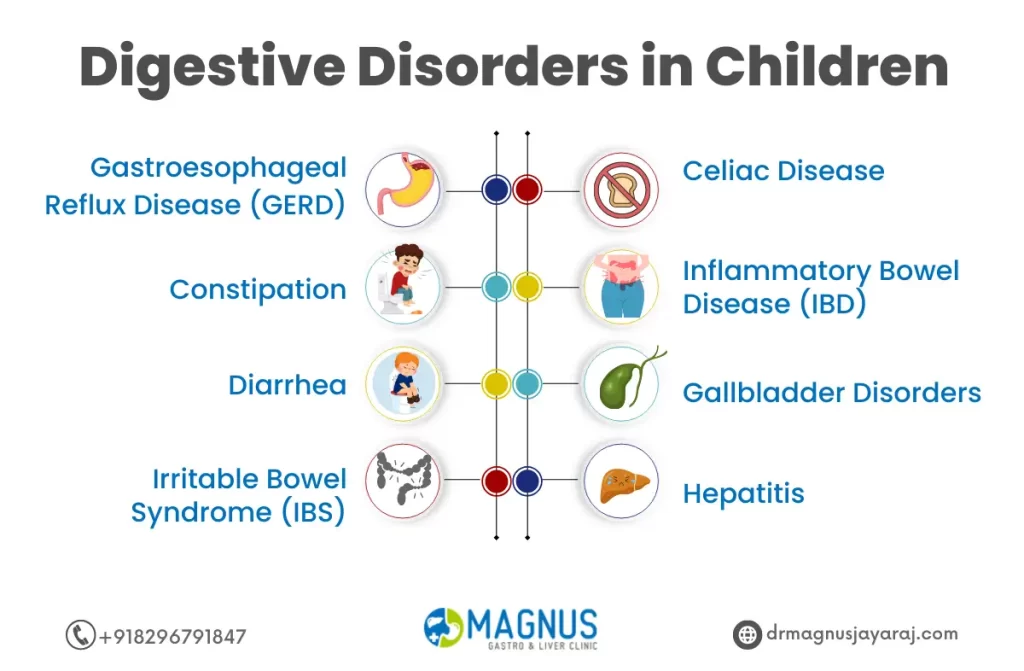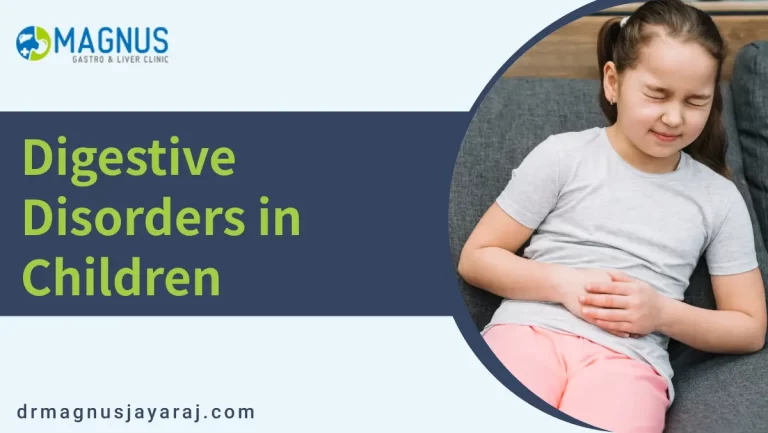Digestive Disorders in Children are full of energy, curiosity, and laughter, but when it strikes, it can be concerning and stressful for parents. Digestive issues are not uncommon in kids, and being well-informed about these conditions is crucial for understanding and managing them effectively. In this blog post, we will explore digestive disorders in children, provide insights into their causes and symptoms, and offer guidance on how parents can help their little ones find relief and maintain optimal digestive health.
Common Digestive Disorders in Children
Digestive problems in children encompass a variety of conditions that impact the gastrointestinal system. Among the prevalent digestive issues are:
- Gastroesophageal Reflux Disease (GERD): This condition involves the flow of stomach acid into the esophagus, leading to heartburn and discomfort.
- Irritable Bowel Syndrome (IBS): IBS can cause abdominal pain, constipation, diarrhea, and bloating, affecting a child’s regular bowel movements.
- Constipation: Chronic constipation can lead to pain and discomfort, making it difficult for children to have regular bowel movements.
- Food Allergies and Intolerances: Allergies or intolerances to certain foods can trigger digestive symptoms, including nausea, diarrhea, or abdominal pain.
Causes and Symptoms
Understanding the causes and symptoms of digestive disorders in children is crucial for early detection and management. Some common causes include genetics, diet, stress, and infections. Symptoms can vary widely, but parents should look out for signs such as:
- Abdominal pain or discomfort
- Frequent diarrhea or constipation
- Bloating and gas
- Nausea and vomiting
- Blood in stools
- Poor weight gain
- Changes in appetite

Recognizing these symptoms and consulting a healthcare professional promptly is essential to ensure an accurate diagnosis and appropriate treatment.
Diagnosis and Treatment
Diagnosing digestive disorders in children often involves a combination of medical history, physical examination, and various tests, including blood tests, stool samples, and imaging studies. Once diagnosed, treatment approaches may include:
- Dietary Modifications: Adjusting the child’s diet to avoid trigger foods or to incorporate food good for digestive disorders.
- Medications: Prescribed medications may help alleviate symptoms, such as antacids for GERD or laxatives for constipation.
- Lifestyle Changes: Encouraging regular physical activity and stress-reduction techniques to manage symptoms.
- Behavioral Therapy: Cognitive-behavioral therapy can be beneficial for children with IBS to address the impact of stress on their condition.
Food Good for Digestive Disorders in Children
Nutrition plays a pivotal role in managing digestive disorders in children. Certain foods can help soothe digestive discomfort and promote gut health. Foods that are good for digestive disorders include:
- Fiber-Rich Foods: Foods high in soluble fiber, such as oats and fruits, can aid in relieving constipation and promoting regular bowel movements.
- Probiotic Foods: Yogurt and fermented foods like kefir contain beneficial bacteria that can support a healthy gut microbiome.
- Ginger: Ginger has natural anti-inflammatory properties and can help alleviate nausea and indigestion.
- Bone Broth: Rich in collagen and amino acids, bone broth can soothe the digestive tract and promote healing.
- Bananas: Bananas are gentle on the stomach and can help alleviate diarrhea.
It’s important for parents to work with healthcare professionals and dietitians to determine the most suitable dietary modifications for their child’s specific condition.
Conclusion
In conclusion, digestive disorders in children can be challenging, but with the right information and support, parents can help their little ones manage and overcome these conditions. By understanding common digestive disorders, recognizing symptoms, seeking prompt medical attention, and making dietary and lifestyle adjustments, parents can play a crucial role in their child’s digestive health.
Check out the Best Doctor in Chennai.


